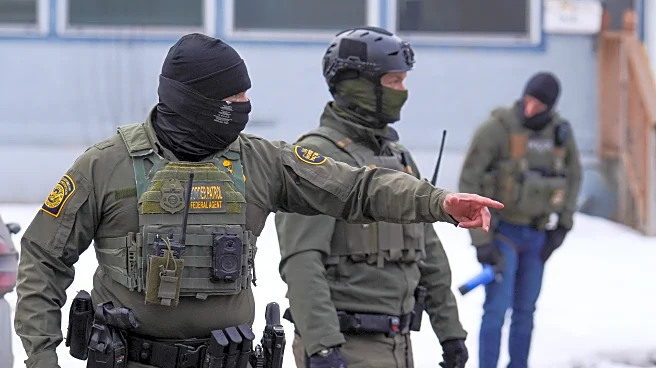What's Happening?
Russian President Vladimir Putin announced that Moscow will adhere to nuclear arms limits for one more year after the expiration of the New START treaty with the United States in February 2026. This decision is contingent upon the United States reciprocating the adherence to the treaty's limits. Putin emphasized the negative consequences of the treaty's termination for global stability and nuclear proliferation. The New START treaty, signed in 2010, limits each country to no more than 1,550 deployed nuclear warheads and 700 deployed missiles and bombers. The treaty's expiration and lack of dialogue for a successor deal have raised concerns among arms control advocates about a potential new nuclear arms race.
Why It's Important?
The extension of nuclear arms limits by Russia is significant as it aims to prevent a strategic arms race and maintain global stability. The adherence to the treaty's limits could foster an atmosphere conducive to strategic dialogue between Russia and the United States. This move is crucial in reducing tensions and avoiding the proliferation of nuclear weapons, which could lead to increased risks of nuclear conflict. Arms control experts have urged both nations to reach an interim deal to maintain existing nuclear weapons limits, highlighting the importance of diplomatic efforts to curb nuclear arsenals and prevent a costly arms race.
What's Next?
Russia expects the United States to follow its example and adhere to the treaty's limits. Putin has instructed Russian agencies to monitor American activities related to strategic offensive arms, particularly concerning missile defense systems. Any destabilizing actions by the U.S. could prompt Russia to respond accordingly. The continuation of dialogue and negotiations between the two countries is essential to establish a successor deal to the New START treaty and ensure long-term nuclear arms control.
Beyond the Headlines
The decision to extend nuclear arms limits reflects broader geopolitical tensions between Russia and the West, particularly in the context of the conflict in Ukraine. The adherence to the treaty's limits could contribute to normalizing bilateral relations and reducing provocations, such as Russian drones landing on Polish soil and airspace intrusions. The move also underscores the importance of maintaining strategic stability and preventing the escalation of military conflicts beyond Ukraine's borders.











